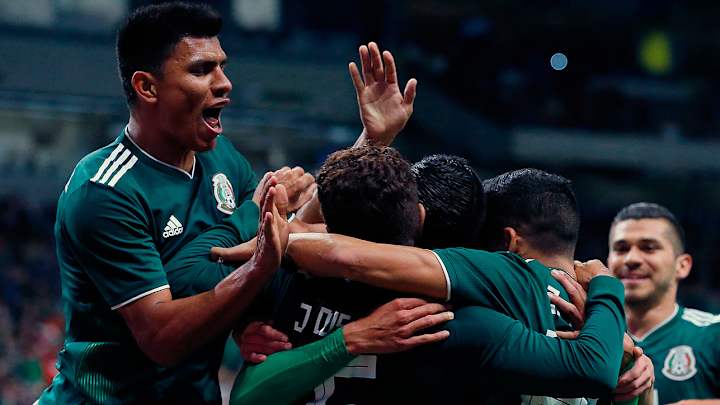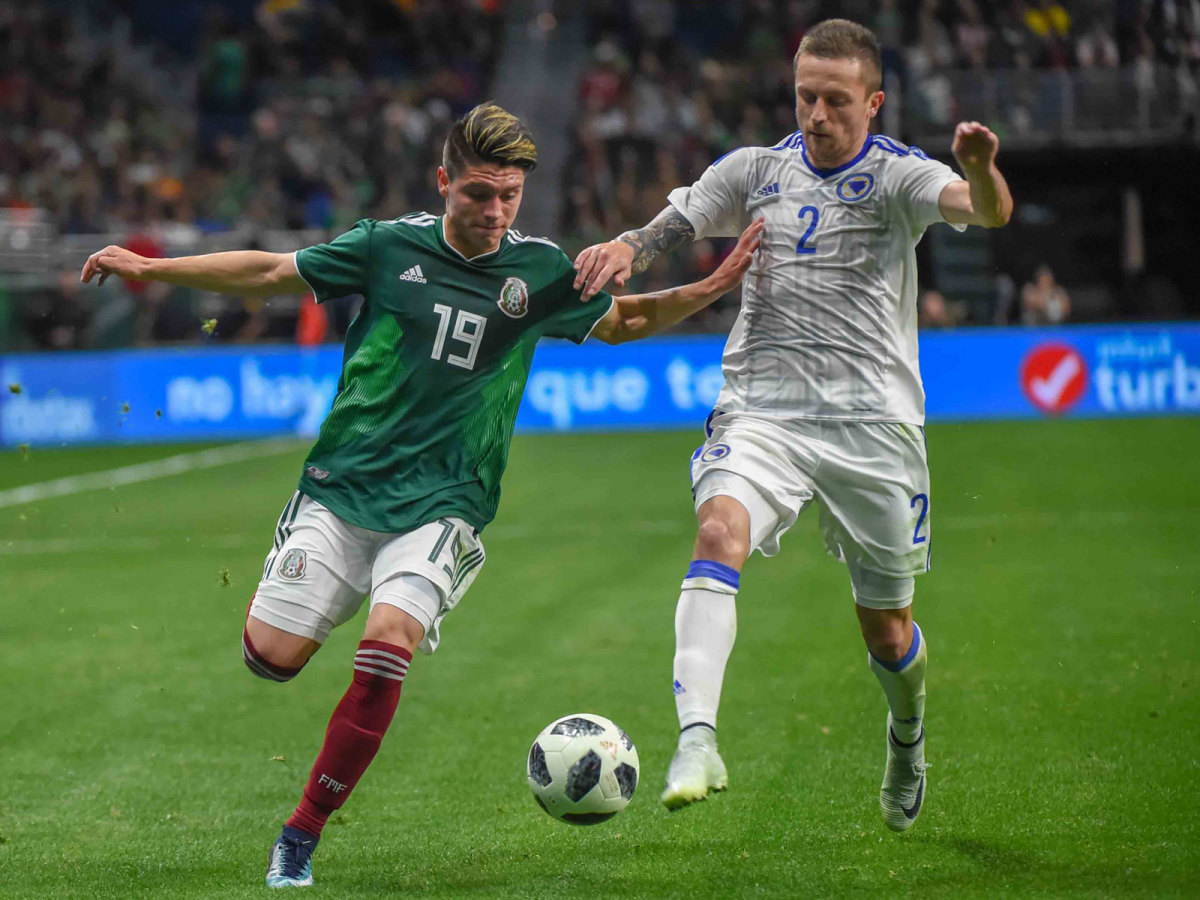Osorio in Full Experimentation Mode as Mexico Edges Bosnia in World Cup Tune-Up

On Wednesday evening, Mexico kicked-off its World Cup year with a solid, straightforward 1-0 victory against an experimental Bosnia and Herzegovina side in San Antonio.
More than 26,000 fans showed up at the Alamodome, as a vast majority of Mexican fans (and some Bosnian supporters) witnessed a solid albeit not magnificent display by Juan Carlos Osorio’s men.
It won’t be one for the history books, but it was a match where we witnessed Jonathan Gonzalez’s first appearance for El Tri, Carlos Vela playing three different positions and a great performance by the reliable Hugo Ayala, whose goal secured Mexico’s first victory in 2018.
The Mexican squad was made up entirely of Liga MX- and MLS-based players, so this was an opportunity for some to make a strong case for Russia but perhaps the most interesting part of the evening was Osorio’s ability to tinker with strategies and rotation as 17 players took the field tonight, and some in unfamiliar positions.
Nevertheless, this performance was about confidence and creativity and for large parts of the game, Osorio’s Mexico ticked both boxes.
“It was a positive outcome," Osorio said following the match. "There are things to improve, but there were performances that left us really satisfied.”
Here are three thoughts from the next step on Mexico's road to Russia:
The tinkering world of Juan Carlos Osorio
It’s common knowledge among managers, that friendlies–especially those that don’t include your best players–should be used for testing, challenging strategy and approach. On Wednesday, Osorio, who is the ultimate experimenter, took this to another level.
In the first half, Mexico started the first 15 minutes with a 4-3-3 formation, where Carlos Vela played as a center mid next to Elias Hernandez, Giovani dos Santos on the right wing, Orbelin Pineda as his counter on the other side and America’s Henry Martin the lone man up front. A quarter of an hour minutes later and everything changed, as each one switched roles to a 4-1-2-3 formation and rotated as if they were pieces on a chessboard. Vela became a winger, dos Santos move more centrally and Hernandez shifted closer to the striker–all while Jesus Molina, a somewhat forgotten man with Monterrey, stood firm as the defensive midfielder.
No matter what fans or pundits may think of the tinkering, it’s worth remembering that for Osorio, this friendly was made for this exact purpose. His priority right now is to create a squad that can adapt at any given scenario. And when he has a full squad at his disposal, this will be nothing but an advantage to fringe players who are looking to book to their ticket to Russia. In order to attract Osorio’s attention, the ability to adapt will always play to your advantage.
Another special mention goes to Carlos Vela, who played the entire match and was everywhere, especially in the second half, when he took the captain’s armband from dos Santos after he came off. LAFC should be happy.
Sarachan Opts to Play it Safe in USA's Unremarkable Draw vs. Bosnia-Herzegovina
Names who made a case for Russia
A major talking point prior to this match was looking at players who were looking good for Osorio’s final World Cup squad and some names clearly stood out. Jesus Gallardo was excellent on the left hand side, offering much stability and a clear threat throughout the match. So was Tigres’ Luis Rodriguez, who covered a tremendous amount of ground on the right hand side and tucked in as a support midfielder whenever Mexico had possession.
The ever-dependable Ayala was consistent throughout and his excellent header, which secured the 1-0 win, gave Osorio another reason to take him this summer.
¡G⚽️⚽️⚽️⚽️⚽️L @Corona_Futbol! Así el tremendo cabezazo de @hugoac_4 que dejó sin oportunidad a Piric 💥⚽️ 🔝#SoyMéxico pic.twitter.com/Qhiz9YxJON
— Selección Nacional (@miseleccionmx) February 1, 2018
Rodolfo Pizarro only had 15 minutes to impress and that he did as his finesse in the midfield and going forward was a joy to watch. And what about Jonathan Gonzalez? When the 18-year-old California-born midfielder came on in the 57th minute, the San Antonio crowd gave him a warm reception, but it was his performance that deserved attention. He was composed on the ball, but more importantly, he always wanted to attack and offer extra support in the final third, and this is exactly what Osorio wishes to see from the teenager.

“Taking in mind that he’s so young, it was a positive performance. He was so brave in his decision making," Osorio said in his post-match press conference. "It’s not easy to play in his position, which demands specific objectives. He leaves us with the feeling that he really understands the game; he has an extraordinary presence and a promising future.”
Another mention should go to Javier Aquino, who still has the edge over Oribe Peralta for a place in Russia. Not only does he attack the wide areas, but vs. Bosnia he also stayed longer in the box, looking to score at every opportunity. He should be a lock for the World Cup.
As Blame Game Continues Over Jonathan Gonzalez's Decision, U.S. Soccer Denies Neglect
Let’s not get carried away
It’s true that Mexico delivered a strong performance, where its possession total was almost 70%, and things worsened for the visitors after Bosnia’s late red card. But here’s the reality: the opposition, which was made up of a number of inexperienced players on the international level, was not up to par. Perhaps tired from the last few days of traveling and having just faced the USA on Sunday night, fatigue could have been a factor. Even with a limited squad made up entirely of North American-based players, Osorio knows that a win and a good performance were expected, because every advantage pointed in Mexico’s direction. El Tri players had fresher legs, had “home” advantage and were better in almost every way.
But we still saw shades, especially in the first half, where defending the counter continues to be a problem. Creativity going forward can also be an issue, and some careless challenges occurred in random moments due to lack of focus. Sweden, South Korea and especially Germany might not be as forgiving as Wednesday’s opponent on the grand stage in Russia.
“If there are areas to improve it's the finishing," Osorio said. "When we penetrate and the ball comes from the back, our forwards rush the play and we lose big chances. In Mexico and almost the rest of the world, this is something where everyone wants to improve, which is why forwards cost as much they do.”
All in all, it was a good step in the right direction, but until El Tri faces tougher competition–which it will, with future tune-ups against Iceland, Croatia, Scotland and Denmark–that’s all we can call it for now: Just a step.
